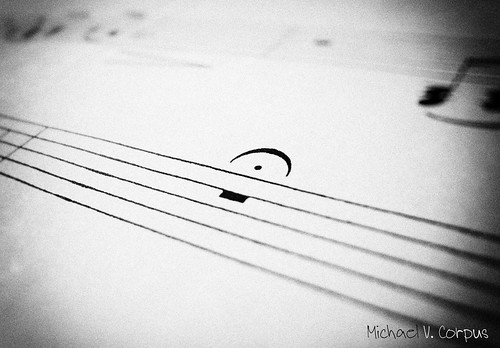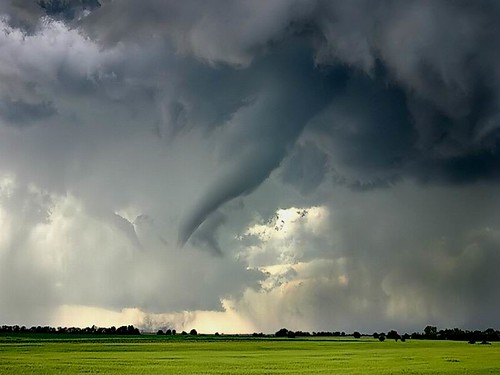I always come back to Cassandra Mortmain: "I write this sitting in the kitchen sink."
I myself am not sitting in the kitchen sink but at my desk. My writing space is actually many places: this room, the kitchen and my sort-of-but-not-really office at work. But this is my primary space, and looking up from the page (er, screen), it's interesting to suddenly be conscious of the space I occupy, and how that creative side has manifested itself. It's not just my living space, but my stories' space.
As Han Solo once said of his ship, "She may not look like much, but she's got it where it counts." This is the extent of my "space." A little to your left, and there's the bed (with a cat asleep on it). A little to your right and there's the vanity. But I have the essentials:
1.) Desk.
2.) Chair. (Not pictured. Doesn't match desk, and I can't adjust it any higher without my knees hitting the drawers. Not exactly an ergonomic arrangement for posture or keyboard. I recently took the arms off the chair so that I could actually push it in.)
3.) Computer.
4.) STUFF. (I'll get to that.)
5.) Window.
6.) Two iPods - one that works, one that is only for my alarm.
On this last note, Stephen King advises against positioning your desk near a window, but to put it in a far corner away from distractions, closing the curtains if necessary. In this house and the one I lived in before this, I have had my desk at a window. I'm not entirely sure why this is - perhaps a way of imagining that I am in a tower looking down on the world, or else sitting in a spot that is guaranteed to bring me the most sunshine, and (if the weather is good) fresh air. In early March, I watched a robin perched in a branch outside the window, shivering in the cold but determinedly waiting for spring. If I'd heeded Mr. King's advice, I would not have had that moment. The fact is, I like my mind to wander here and again. Sure, a busy street isn't the prettiest sight to behold, but there is enough sky to make up for it.
This is the current face of my ever-changing cork board. To the left are the images associated with the novel I completed recently (Waterwill). To the right are pieces from an older board dedicated to a novel that went Nowhere in six years (Adrian Saint). For years, the Adrian Board has been separate from the Waterwill board, perched precariously on the cork board's top (where the owl is). It took me forever to take Adrian down. I mean an eternity. I might have been clinging to the old dream of the thing, or perhaps it gave me comfort, some hope that Adrian was (and still is, mind) waiting for me to come back to it. As a whole, the board gives testimony to my need for visuals: to actually see face, cellos and stars, old maps, old keys and pocket watches, waterscapes and drowning islands, spindles, portcullises, Doctor Who, old libraries, crows and cloisters. Here, my novels are alive.
A close up of the desktop. It is usually not this nice. Over the course of a week, it gets inundated with notes and lists, books, random purse-items. When it's cleared off, like it is now, I can write with relief.
Partial window view. Sometimes the computer is over on the other side, but most often, I like to sit where there is the most light.
A highlight. This is my grandfather's abacus. I can't remember how it wound up in my possession - I've had it a long time. All I know is that it makes interesting wall art. I haven't the faintest idea how to use it, either, so it embodies a mystery.
Detail. One of those Willowtree figurines, the Angel of Learning. Previous finished journal which I won't put away because it has Things I Might Need. The Q&A journal. A card of writing motivations. And "edible ball-bearings" (Perles du Sucre d'Argent) from Michelle, paying homage to a Doctor Who episode we love. (I haven't had the heart to eat them!)
Detail. In the corner bookcase we have my other journals. Guess which ones are blank and which ones are full to capacity! Also, a bell from a wedding reception in 2010. Decorative gourd from Mexico (holds buttons). Part of my other owl.
Detail. Some things just happen a certain way. My life is not art. Sometimes it resembles a jumbled mess of things I don't know what to do with but Might Need. Hence, we have (dry) calligraphy pens to an old vase, a camera in a teacup, old Christmas and birthday cards, a thesaurus I haven't used in years, The Artist's Way and Mr. King's book, and a French dictionary. (Latin is at work, otherwise it would be here somewheres.) At least it's colorful, right?
And last but not least, what makes blogging easier is a nice cup of tea. In this case, steaming away on the desk beside me, some delectable, decaf Chai. Sometimes it's green. Other times it's black, peppermint or ginger. Trader Joe's has a seasonal green tea called Crimson Blossom, filled with all sorts of goodness; it starts out green and turns red as it steeps. Believe me, there's nothing better than a spot of tea and fresh air moving through an opened window to help along an afternoon of furious blogging.
I don't know exactly what a full analysis of my space can tell you about my life as a writer. I hope it says that I try to use what I have to make life more interesting, that I try to think outside the box from inside in this room, that I get carried away. But isn't this like blogging, itself? A collection of thoughts put together in the best order we can make of them? That is in itself art - unintended maybe, but beautiful nonetheless.



























 Sandy - with the Sheldon Art Museum to the south of her
Sandy - with the Sheldon Art Museum to the south of her




